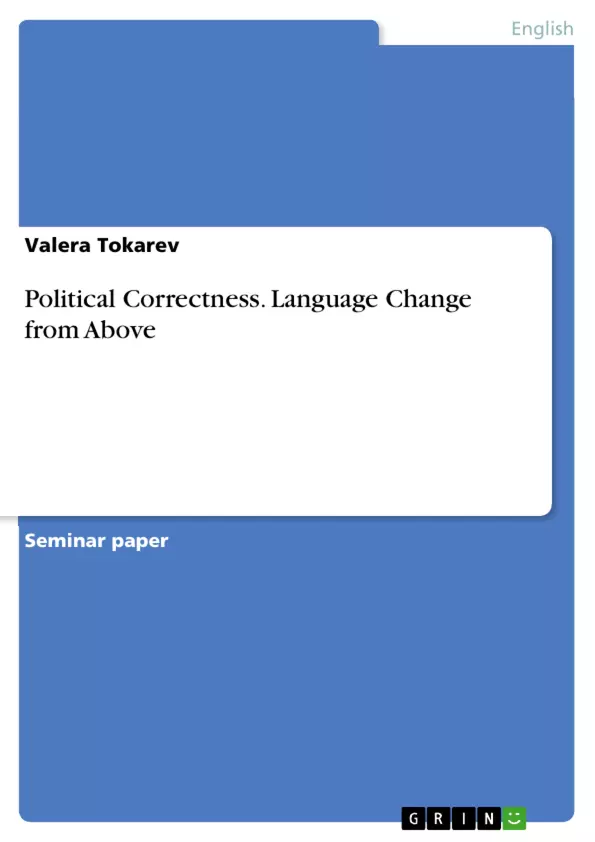The thesis of my paper is that prescriptions of politically correct language cause language change and may lead to an increasing equivocalness of language by incorporating euphemisms. To back up this argument, I will introduce the model of the so called euphemism treadmill created by linguist Steven Pinker. At first, a definition of the term political correctness will be given in the introduction. Furthermore, I will examine how language is changed through PC and through which mechanisms prescriptive speech codes emerge and can spread nationwide.
Additionally, due to the fact that the very first speech restrictions were set up on US high school campuses, I will also provide a survey in which I analyze the Self-attitude of students of the Philosophical Faculty (University of Cologne) towards politically correct language, with a special focus on nonsexist/genderneutral language. The results will be then compared to the current situation in the U.S.
Table of Contents
- Introduction
- Political Correctness – Definition and History of Political Correctness in the USA
- Process of Political Correctness - Language Change from „above”
- Critique on Political Correctness - Is PC going too far?
- Euphemisms - Origins and Use
- Political Correctness causes Equivocalness in Language
- The Euphemism Treadmill
- Survey on Non-Sexist Language at The University of Cologne
- Results
- Conclusion
Objectives and Key Themes
The paper aims to demonstrate how prescriptions of politically correct language cause language change and may lead to an increasing equivocalness of language by incorporating euphemisms. The author will utilize the model of the euphemism treadmill created by linguist Steven Pinker to support this argument. The paper will also provide a survey analyzing students' attitudes towards politically correct language at the University of Cologne.
- The impact of political correctness on language change
- The origins and evolution of the concept of political correctness
- The use of euphemisms in politically correct language
- The role of nonsexist language in promoting equality
- The effectiveness of language reform initiatives in changing societal attitudes
Chapter Summaries
The introduction defines the term "political correctness" and traces its historical development, particularly in the United States. It highlights the changing connotations of the term throughout the 20th century.
Chapter 2 examines how political correctness can lead to language change. It discusses the emergence of nonsexist language reform in the 1970s and the subsequent banning of generic he from standard usage. The chapter provides examples of how language prescriptions are disseminated and adopted by various institutions, including academic associations and colleges.
Chapter 3 focuses on the critical analysis of political correctness. It delves into the origins and use of euphemisms, explaining how they can contribute to the equivocalness of language. The chapter introduces the concept of the euphemism treadmill, which describes the cyclical process of replacing offensive terms with less offensive ones, leading to a gradual escalation of euphemisms.
Keywords
The main keywords and focus topics of this text include political correctness, language change, euphemisms, nonsexist language, gender-neutral language, euphemism treadmill, and societal attitudes towards politically correct language.
Frequently Asked Questions
What is the "euphemism treadmill"?
A linguistic model by Steven Pinker describing how neutral terms become offensive over time and are replaced by new euphemisms in a continuous cycle.
How does Political Correctness (PC) cause language change?
PC acts as "language change from above" through prescriptive speech codes and institutional guidelines, such as banning the generic "he."
Where did the first PC speech restrictions emerge?
The first formal speech restrictions were primarily established on US high school and university campuses.
What is nonsexist or gender-neutral language?
Language designed to avoid bias toward a particular sex or social gender, aiming to promote equality through linguistic reform.
Does PC lead to equivocalness in language?
The thesis suggests that by incorporating many euphemisms, language can become less precise or increasingly ambiguous.
- Arbeit zitieren
- Valera Tokarev (Autor:in), 2016, Political Correctness. Language Change from Above, München, GRIN Verlag, https://www.grin.com/document/382469



